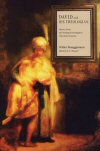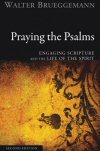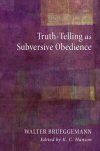Select Works of Walter Brueggemann (9 vols.)
Digital Logos Edition
Overview
Walter Brueggemann is one of our time’s most beloved theologians and one of the world’s foremost scholars on the Old Testament. He has inspired young scholars and students, and driven the discourse on theology with some of the biggest players in contemporary Bible scholarship. This collection contains some of Brueggemann’s most recent and personal works. These volumes of Old Testament exegesis and its importance to Christian ministry and spirituality deliver the thorough and compelling work the world has come to expect from this giant of Christian scholarship.
Check out a bundle of Brueggemann’s contributions to Old Testament studies in the Fortress Press Walter Brueggemann Collection (27 vols.).

- Gathers nine volumes from renowned Old Testament exegete, Walter Brueggemann
- Applies the Old Testament to Christian ministry and spirituality
- Includes close readings of Joshua and the Psalms
- Title: Select Works of Walter Brueggemann (9 vols.)
- Author: Walter Brueggemann
- Publisher: Wipf & Stock
- Volumes: 9
- Pages: 1,221
- Resource Type: Collected Works
- Topic: Biblical Studies
Individual Titles
- A Pathway of Interpretation: The Old Testament for Pastors and Students by Walter Brueggemann
- David and His Theologian: Literary, Social, and Theological Investigations of the Early Monarchy by Walter Brueggemann
- Divine Presence amid Violence: Contextualizing the Book of Joshua by Walter Brueggemann
- Ichabod Toward Home: The Journey of God’s Glory by Walter Brueggemann
- In Man We Trust: The Neglected Side of Biblical Faith by Walter Brueggemann
- Praying the Psalms: Engaging Scripture and the Life of the Spirit by Walter Brueggemann
- Remember You Are Dust by Walter Brueggemann
- To Act Justly, Love Tenderly, Walk Humbly: An Agenda for Ministers by Walter Brueggemann, Sharon Daloz Parks, and Thomas Groome
- Truth-Telling as Subversive Obedience by Walter Brueggemann

Writing with the pastor and student in mind, Walter Brueggemann provides guidance for interpreting Old Testament texts. He offers advice for the interpreter as well as examples of working with different sorts of passages—including narratives, prophecies, and Psalms. He also demonstrates how to work thematically, drawing together threads from different traditions. He works through the rhetoric of these passages, reaching toward theological interpretation. The investigations reflect Brueggemann’s conviction that the process of moving from text to interpretive outcome is an artistic enterprise that can be learned and practiced.
One of the best and most esteemed interpreters of Scripture shows here how he does it. . . . Vintage Brueggemann: incisive, penetrating, provocative, and always seeking to uncover the cutting edge of the text.
—Patrick D. Miller, Charles T. Haley Professor of Old Testament Theology Emeritus, Prince Theological Seminary
. . . seldom has an author taken us step-by-step through the actual progression of that thought. This is precisely what Walter Brueggemann does in this book.
—Dianne Bergant, distinguished professor of Old Testament studies, Catholic Theological Union
This is the book that those of us who have studied with Walter Brueggemann have been waiting for. Here is the teacher we have known in class: telling us how he has come to read Scripture as he does and showing us how he does it.
—Edwin Searcy, pastor, University Hill Congregation, United Church of Canada, Vancouver, BC

Throughout Walter Brueggemann’s career, he has repeatedly found his way back to David and royal traditions. From some of his earliest articles and essays, to monographs, commentaries, and sermons—he has explored this rich field in literary, social, and theological depth. This volume brings together some of Brueggemann’s key essays on the David traditions, as well as their interrelationships with traditions in the book of Genesis.
[David and His Theologian’s] chapters feature the typical hallmarks of Brueggemann’s scholarship: strong arguments on important themes, a very sharp eye for exegetical detail, a profound sensitivity to the theology of the narratives and a remarkable freshness of style.
—Philip F. Esler, Portland Chair of New Testament Studies, University of Gloucestershire
Various critical studies of the imposing figure and theological importance of David, written throughout the remarkable career of Walter Brueggemann, are brought together in this volume.
—Dianne Bergant, distinguished professor of Old Testament studies, Catholic Theological Union
For a focused probe on the royal establishment, and on the man who most enigmatically embodied it, there is no better place to begin than by reading David and His Theologian.
—Samuel E. Balentine, director of graduate studies and professor of Old Testament, Union Presbyterian Seminary

Investigating “revelation in context,” Walter Brueggemann examines the difficult text of Joshua 11. Brueggemann seeks to explain the presence of the violence in the Old Testament, perpetrated in the name of the Lord. He addresses the problem by treating these texts as an embarrassment to Christians, dealing specifically with whether violence is at odds with the character of God.
The book is a brilliant primer in persuasive, open-ended theological interpretation. It will help pastors, students, and anyone who would like to join the hot debate about violence and the God of the Bible.
—Kathleen M. O’Connor, William Marcellus McPheeters Professor of Old Testament Emerita, Columbia Theological Seminary
For all those vexed by texts of violence in the Bible, this splendid little book is a ‘must-read.’
—Louis Stulman, professor of religion, The University of Findlay

In this volume, one of today’s most respected biblical scholars explores the nature of God’s glory, using the engaging story of the ark of the covenant to illuminate the meaning of God’s presence—not only for the ancient Israelites but for the whole world.
Offering a unique entry into Old Testament theology, Walter Brueggemann examines 1 Samuel 4–6, the biblical text in which the ark of God is captured by the Philistines, seen to be a dangerous threat, and finally returned to Israel. In looking anew at what this story reveals about God’s glory, Brueggemann builds a powerful new theology of God’s sovereignty.
Additionally, Brueggemann demonstrates that this ancient story of the ark has profound relevance today. The three-day story of the ark’s capture, detention, and return is transposed, first, into the three-day Christian story of Easter and, second, into the three days of the modern consumer weekend. In a provocative contemporary application of Old Testament theology, Brueggemann shows that the Ark narrative, in its rendering of God’s glory, strongly contradicts the dominant narrative of our own culture, with its strident emphasis on self-indulgence, narcissism, and self-sufficiency.

Walter Brueggemann puts forth a “fresh hearing of the gospel” communicated in Old Testament tradition. Brueggemann focuses on how we neglect how the Bible affirms human culture, capability, and responsibility as a part of the biblical narrative and gospel story. He zooms in on the book of Proverbs and the wisdom traditions it contains that affirm the world and celebrate culture.

In this thoroughly revised edition of a classic on spirituality, Walter Brueggemann guides the reader into a thoughtful and moving encounter with the Psalms. Brueggemann encourages us to let the language of the Psalms “reshape our sensitivities and fill our minds with new pictures and images that may redirect our lives.” This new edition includes a revised text, new notes, and new bibliography.
I know of no better book for introducing a congregation to the Psalms than this one.
—Edwin Searcy, pastor, University Hill Congregation, United Church of Canada, Vancouver, BC
[Brueggemann’s] treatment of both the post-Holocaust Christian use of these very Jewish prayers and the troublesome call for vengeance is most timely.
—Dianne Bergant, distinguished professor of Old Testament studies, Catholic Theological Union
Few persons have so lived in and with the Psalms as Walter Brueggemann. Here he takes us into their depths, which are so clearly the depths of our human existence.
—Patrick D. Miller, Charles T. Haley Professor of Old Testament Theology Emeritus, Prince Theological Seminary

Taking biblical passages that most Christians are familiar with, Walter Brueggemann draws out new meaning around the theme of God’s grace to us as servants. He argues that we are most free when we are most enslaved to the Lord’s will, as the passions of the moment and the idols of cultures lose their grip on us. Brueggemann’s work is filled with passion for edifying the church, with insights both profound and practical.
Walter Brueggemann is the master of finding fresh and compelling dimensions of meaning in texts so familiar they barely scratch the surface of our consciousness.
—Ronald J. Allen, professor of preaching and gospels and letters, Christian Theological Seminary
One comes away from this book both energized by the vision presented and challenged to make it a reality.
—Dianne Bergant, distinguished professor of Old Testament studies, Catholic Theological Union
There is a reason why Walter Brueggemann remains, for preachers and pastors, the most loved and trusted of all biblical scholars—and that is simply because he writes for us.
—Anna Carter Florence, Peter Marshall Associate Professor of Preaching, Columbia Theological Seminary

In this book, a respected Old Testament scholar, psychologist, and religious educator come together to reflect on the three elements of Micah 6:8. How do the Scriptures require us to respond to the problems of the real world? How can we maintain love in our ministrations to others? How can we speak with real authority while still keeping our humility? The book is geared to assist believers to see how Micah 6:8 helps to provide a convergence point for praxis and spirituality.
Sharon Daloz Parks is director of Leadership for the New Commons at the Whidbey Institute. She was senior research fellow at Harvard Business School and the Leadership Education Project at the Kennedy School of Government.
Thomas Groome is professor of theology and religious education at Boston College. Groome was born in County Kildare, Ireland, and holds the equivalent of an MDiv from St. Patrick’s Seminary in Carlow, Ireland, an MA from Fordham University, and a doctoral degree in religious education from Union Theological Seminary/Columbia University. His most recent books include What Makes Us Catholic: Eight Gifts for Life, Educating for Life, A Spiritual Vision for Every Teacher and Parent, and Christian Religious Education: Sharing Our Story and Vision.

Urging loyalty to the personal truth embodied in Christ over any other institution, Walter Brueggemann critiques our subtle submission to cultural paradigms and encourages truth telling. Brueggemann shows how undivided fidelity to Christ is the only way to remain aware of the world’s pain and how the gospel works in all times and places.
With characteristic eloquence, Brueggemann dares us to believe in new life amidst the sexual, financial, and political lies that surround us.
—Kathleen M. O’Connor, William M. McPheeters Professor of Old Testament Emerita, Columbia Theological Seminary
The provocative essays in this volume are yet another reminder that no one prods the consciences of preachers more effectively, discomfortingly, and profoundly than Walter Brueggemann.
—Thomas G. Long, Bandy Professor of Preaching, Candler School of Theology
Truth-Telling as Subversive Obedience trades in a sort of primal candor that dares to confront our most cherished conventions. Perhaps even more strikingly, this little book creates space for the loving embrace of God.
—Louis Stulman, professor of religion, University of Findlay
This title is included in the following collections
You can save when you purchase this product as part of a collection.
Select Works of Walter Bruegge...
$944.48$754.99Logos 9 Portfolio Legacy Libra...
$4,749.99$4,749.99Wipf and Stock Ultimate Collec...
$11,593.84$8,499.99Logos 9 Collector's Edition Le...
$11,399.99$11,399.99
- $24,999.99
Walter Brueggemann, through his teaching, lecturing, and writing, has effectively demonstrated the significance of the Old Testament for our fractured world today. Recognized as the preeminent interpreter of the ancient Hebrew texts in relation to questions posed by a variety of academic disciplines, he has shown the way toward a compelling understanding of the major components of the faith and life of ancient Israel, especially its Psalms, its prophets, and its historical narratives.
Brueggemann is William Marcellus McPheeters Professor of Old Testament Emeritus at Columbia Theological Seminary in Decatur, Georgia. He is past president of the Society of Biblical Literature and the author of numerous books, including David’s Truth: In Israel’s Imagination and Memory, Interpretation: A Bible Commentary for Teaching and Preaching Genesis, and The Message of the Psalms: A Theological Commentary.
Reviews
3 ratings

Ralph A. Abernethy III
9/7/2017
Prophet_kevin
4/1/2016
Anthony Sims
6/5/2015

Clint Augustyn
2/25/2015
Judy, I certainly can understand your concern about theology and your need to hold strongly to what you believe to be true, biblical, and non-negotiable. If you find a teacher to be distasteful or outright heretical, you certainly are within your moral rights to say something. Just understand that there are multitudes of others that are also within their moral rights to believe differently. Somehow I think that none of us has God fully in our grasp and we may all just be serving the same Jesus Christ in the process. Frankly, I'm just not sure that God is glorified when we publicly call out those who have a different view of God than ourselves, especially when we are trying to listen and obey the very same Lord. In fact, only listening to those who keep within our precise boundaries is somewhat incestuous, limiting the ways in which we see God to those which merely affirm what we already deeply believe. In the end, you may still disagree with Dr. Brueggemann, but you would be much better for it to have actually struggled alongside of him as he works through some of his writings, rather than disparaging him because of issues within your own denomination (per your post) or something uncited that you apparently read on the internet.
Brian Poad
2/22/2015
It has to be hard being a retailer, trying to satisfy all the different denominations being represented on here. There are certain books that I wouldn't read or touch, because I would regard them as heretical, but I definitely cut some slack for Logos, considering that people from all denominations are represented.
JudyN
2/21/2015
I have become uncomfortable with the selection of books being thrown at us in the pre-pub offers. I am beginning to see a tent that has become too wide. Today’s selection of Walter Brueggemann books is a case in point. I have looked at this author in the past and believed him to be a liberal theologian. So I have looked some more. I am not going to do an in depth analysis but rather for purposes of this review point out two major concerns. As far as I can tell in his writings on the internet, Dr. Brueggemann equivocates on whether the resurrection of Jesus was a real historical event. In addition, in the offered book, “Truth-Telling as Subversive Obedience,” on page 2, Brueggemann appears to affirm opinions by Krister Stendahl and E.P. Sanders, proponents of the New Perspectives on Paul, that the dichotomy of law and gospel needs to be re-examined. New Perspectives on Paul and Federal Vision have become huge issues in Reformed Theology and in my denomination, Presbyterian Church in America. Such teachers need to be called out, publicly. I am not a theologian or pastor but consider myself as a lay apologist. I have several books in my home that I consider as false teachings. Examples are The Book of Mormon, the Holy Bible (New World Translation), as well as writings by Rudolph Bultmann and Marcus Borg. Inside of each book, I have a warning sticker about the contents for the benefit of my descendants. With the Brueggemann collection, we are given no warning, but rather words of praise about this resource. When I began with Logos in 2006, I experienced the books to be true, conservative and evangelical. (Of course, I always try to be a Berean). This has changed in the last year, at least. If I am wrong about Dr. Brueggemann or about the type of books we are being offered, I hope another Logos user or Logos staff member can correct me.